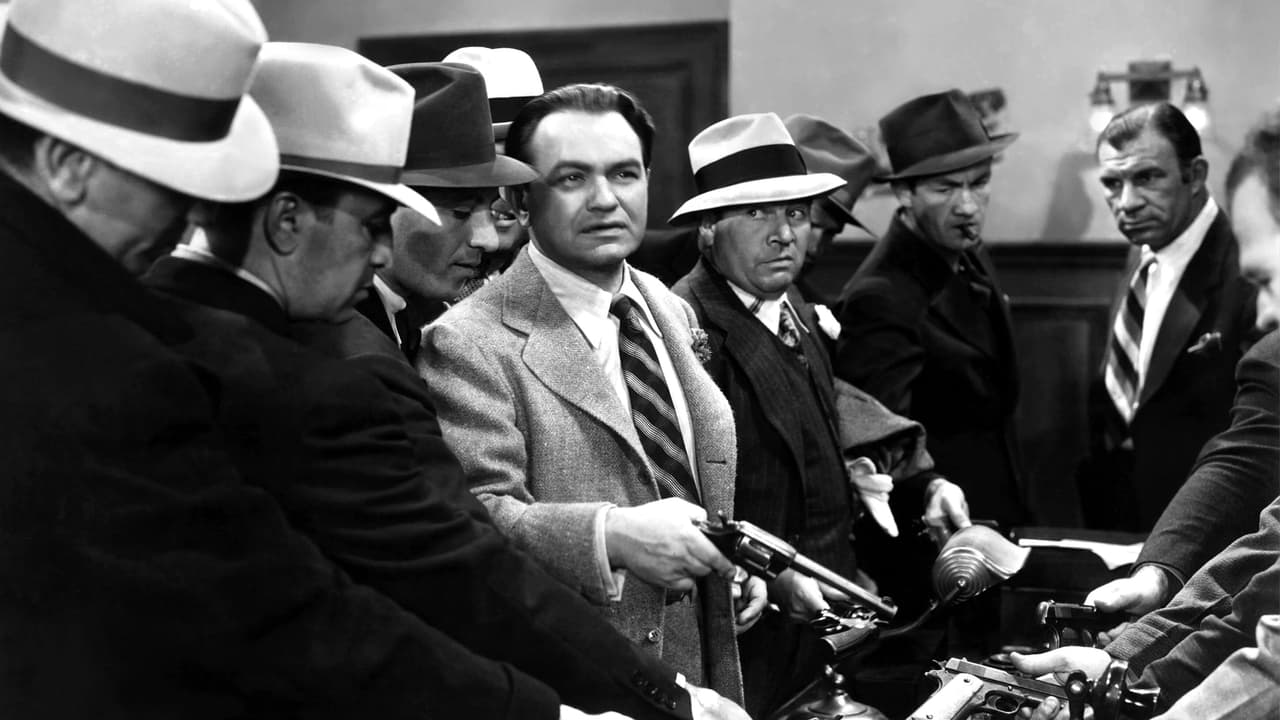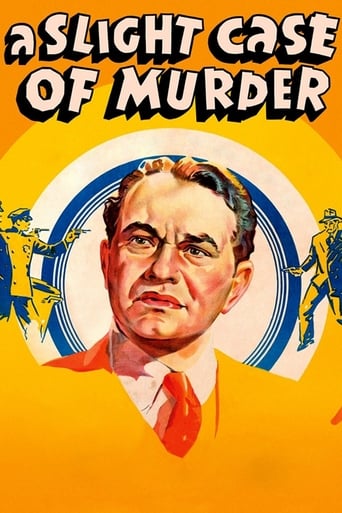

Entertaining from beginning to end, it maintains the spirit of the franchise while establishing it's own seal with a fun cast
... View MoreWhile it doesn't offer any answers, it both thrills and makes you think.
... View MoreThe thing I enjoyed most about the film is the fact that it doesn't shy away from being a super-sized-cliche;
... View MoreThis is a small, humorous movie in some ways, but it has a huge heart. What a nice experience.
... View MoreOne of the 10 greatest comedies in my opinion. The cast if perfect with Ed Trophy and Allen Jenkins showing what comedic ability they have, needless to say Robinson's. i have loved this movie ever since i was young and watched this so many time over the years i cannot even estimate. Just shows that comedy can be done without the vulgar crassness of what they call comedy today.
... View MoreAlthough he had played a variety of roles in his career up to 1938, Edward G. Robinson had become known for his gangster, criminal and tough guy roles. "Little Caesar" of 1931 was the blockbuster film and performance that set the typecast of Robinson for several years. He had done no comedy before "A Slight Case of Murder," but this film showed that he had a knack for humor. This film on DVD has a bonus featurette. In it, film historians and writers say that this was one of Robinson's favorite films. He thoroughly enjoyed making this film, breaking away from his typecast. He would go on to star in more crime, mystery and suspense films, but he also had some very good drama roles in biographies, war films and thrillers. He made three more comedies. Two had plots paired with crime: "Brother Orchid" of 1940, and "Larceny, Inc." of 1942. A good war comedy was "Mr. Winkle Goes to War" of 1944. I devote so much to Robinson here because his role is so different and refreshing, and he plays it to the hilt. It's clear that he enjoyed making this movie. And, while the best humor, and bulk of it in the film, is in his character of Remy Marco, a tremendous supporting cast piles more humor onto the heap. Ruth Donelly plays Remy's wife, Nora. Remy's three lugs are some of the best dopey characters in crime in movies around that time. Allen Jenkins plays Mike, Edward Brophy is Lefty, and Harold Huber is Giuseppe ("Jip"). Other comedy comes from Paul Harvey as Mr. Whitewood and Willard Parker as Dick Whitewood. Bobby Jordan plays Remy's vacation orphan guest, Douglas Fairbanks Rosenbloom. Many others in this huge cast have snippets of humor here and there. The movie is billed as a satire, and that it is. It's a spoof of racketeering and of the very gangland culture that arose during prohibition. The film is based on a Damon Runyan play. Runyan was known for his chronicling of life on the streets of New York, especially around Broadway; and the stories he wrote, many of which were made into stage plays and/or movies. E.G. Robinson never won an academy award, but he was a highly acclaimed actor for four decades. He was well liked off screen by his colleagues who found him to be a gentle soul. In his real life he was a refined person who could speak several languages. He was a serious collector of art, especially paintings. In his tough guy and criminal roles, his characters often were poorly educated guys who spoke street language. So, when one knows his real background, Robinson is very funny as he rattles off his dialog in this comedy satire. I can imagine him and others of the cast cracking up between takes, at some of the buffoonish dialog. Here are some of my favorite lines from this film. Remy, "Oh, and by the way – have Mike take the spittoons out of the living room.""Dear boss, we've tooken a half hour off. Mike." Remy, "Look at the way he spells tooken – with two o's."Norma, "I'm thinking of your father. He doesn't like ruffians. He's a pacifist."Remy, "Never treat a sucker like so much dirt when he's down. Play ball with him and you'll find you always get a little better edge in the end."Remy," And remember, you always come out on top with honesty, integrity, and a good hard right to the button."Mike tells Remy they found Dutch Schultz and three others bodies upstairs. "They were shot right in the middle of a game, and one of 'em had a king flush." Remy, "Which one of 'em had the king full, Little Dutch?" Mike, "Yeah." Remy, "I thought so. Lucky fink, that Little Dutch." The boys at Star of Good Hope Orphanage sing a song when their distinguished alumnus, Remy Marco, comes to visit. "How do you do, Mr. Marco, how do you do? All the happy little orphans welcome you. We are glad that you are here, 'Cause you always bring a cheer. How do you do, Mr. Marco, how do you do?"
... View MoreEdward G. Robinson was one of the most gifted leading actors to appear in film. However, he had two major strikes against him. First, he was physically unattractive---short of stature and homely of appearance. Second, he had the misfortune to achieve early success as a Warner Brothers gangster-type---so much so that he had great difficulty in breaking out of this mold. After all, why would the studio tinker with the popular packaging of one of its great stars, when all it had to do was keep putting him in similar vehicles year after year? Humphrey Bogart, george Raft and James Cagney had comparable problems with Warner Brothers.Every now and then----even under the rigid confines of the studio system at its peak----something happens to show us the existence of other possibilities. Jane Wyman began her career as a chorus girl, and became an important dramatic actress. Joan Crawford and Barbara Stanwyck early on were dancers before becoming stars in a wide range of roles. Dick Powell was a light singing juvenile before making the transition to tough-guy characters. James Cagney was able to demonstrate under this same studio system that given the opportunity, he could be exceptional in both dramatic and musical performances. And of course we all know what happened when Bogart got the chance to play Rick in "Casablanca." (1942) Therefore----while this vehicle for Robinson was somewhat unusual----it was by no means unprecedented for him to be cast against type in such a delightful spoof of those very gangster roles he had made his own for several preceding years. That he pulled it off so well is a testament to his great range as an actor."A Slight Case of Murder" has plot elements that are common to such later films as "Arsenic and Old Lace" and "The Trouble With Harry." But it is unique in combining the humorous troubles that inadvertently befall a mobster who sincerely wants to "go straight" with how he has to at the same time handle an assortment of unwanted corpses that seems to keep entering his life again and again. Both of these situations create the endless comic possibilities in the story----and make it such an enduring classic of its kind.The Warner Brothers stock company of well-known character actors was on hand to lend their full support to Robinson, and the result is an absolute joy.Many years later, Robinson would reprise his classic gangster type in "Key Largo" (1948) Too bad that he never again had the chance to revisit his comic version of that same role. To see how difficult this is to do----take a look at the remake of "A Slight Case of Murder" with Broderick Crawford (in the Robinson role) called "Stop, You're Killing Me"(1952). Crawford may have been a gifted actor in his own right, and was an Oscar winner for "All The King's Men"(1949). But his performance is clearly inferior to Robinson's.Watch "A Slight Case of Murder" to see a great dramatic actor at his prime doing comedy of all things----and very successfully!
... View MoreThis is a funny and relatively fast paced gangster comedy--yes I did say "ganster comedy". It's about a gangster boss trying to go legitimate after prohibition was repealed. He tries, unsuccessfully, to market the same horrible beer that sold well during prohibition (the clientèle was less choosy when that's all they had to chose from). The problem is that in addition, bad stuff keeps happening around him that he had nothing to do with, but with his reputation he certainly would get the blame for! Try as he might, bad stuff just keeps happening.Edward G. Robinson does a very good job with comedy. If you liked this film, try The Whole Town's Talking or Larceny, Inc. to see more of his comic talents.By the way, I have absolutely no idea why, but the studio remade this film as "Stop, You're Killing Me" in 1952 (with Broderick Crawford in the lead). My advice is just stick with the original--it's better in every way.
... View More